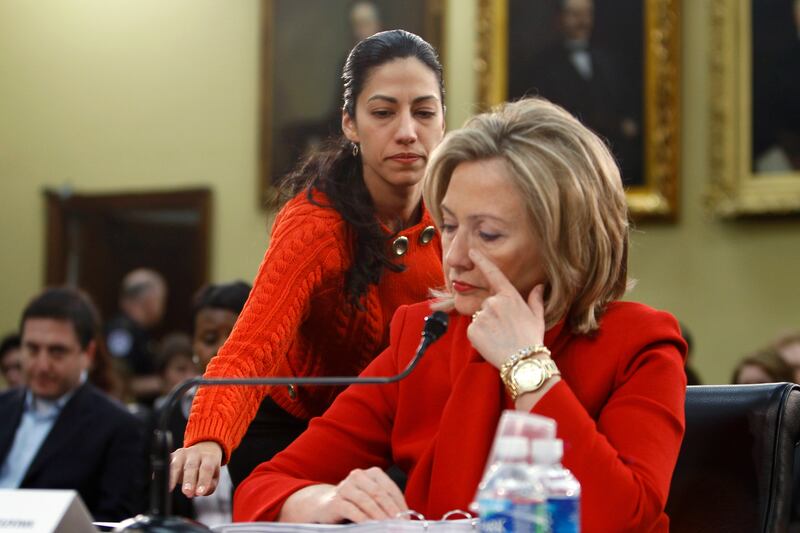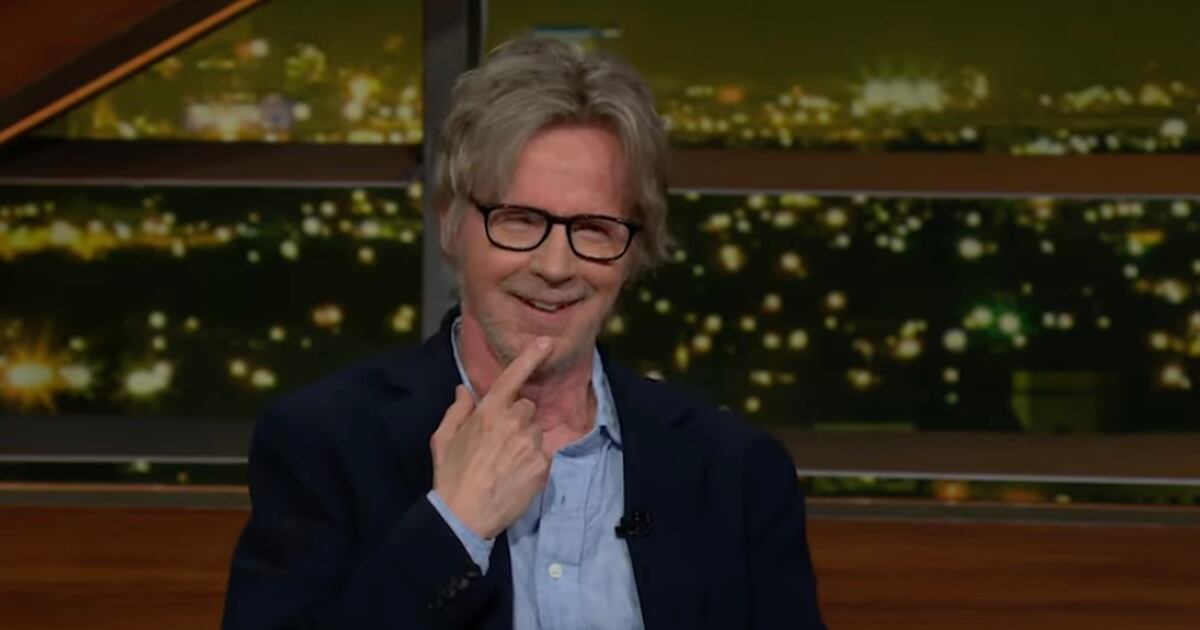Huma Abedin’s face had been carved into a Glasgow smile.
It is the midway point of Weiner, a film that takes you inside Anthony Weiner’s farcical bid for mayor of New York City, and his wife, Abedin, having endured a carnival of cruelty at the hands of her self-described “argumentative, perpetually horny” husband, is rendered emotionally catatonic. The camera homes in as she labors over her morning coffee and ingests her daily vitamins, and as it does, the man behind it asks how she’s faring.
“It’s like living a nightmare,” she says, flashing that mutilated grin.
The level of access in Weiner, directed by Josh Kriegman and Elyse Steinberg, is truly astonishing. Much of this is thanks to Kriegman, who’d previously served as the district chief of staff to Weiner during his tenure in Congress representing New York’s 9th District, as well as its subject’s unbridled narcissism. There are scenes that will make your jaw drop, like the one toward the end of the film where, at Howard Stern’s behest, one of Weiner’s sexting partners— 22-year-old Sydney Leathers, whom his staff refers to by her code name, “Pineapple”—crops up at the venue of his concession speech with a cameraman in tow.“I’m not going to face the indignity of being accosted by that woman,” Abedin warns Weiner. So, the couple is forced to cut through a midtown Manhattan McDonald’s and into Connolly’s Pub, as the newly minted porn star Leathers scampers after them in heels.
It took Kriegman two years to convince Weiner to document him on film—until the morning of his mayoral announcement when he received a surprise text from the pol giving them the green light. For Steinberg, who’d last made a doc about the trial of Saddam Hussein, she says she was “excited about the possibility of doing a character-driven, verité documentary” that went beyond the sensational headlines, granting us a more nuanced view of a man brimming with contradictions.
“You see political scandals and celebrity meltdowns all the time, but you rarely get to be in the room when it happens,” says Steinberg. “This film shows what it’s like to be in the center of a media firestorm.”
For those blissfully unaware of said firestorm, Weiner was once a well-regarded Democratic congressman from New York who’d made a name for himself as the youngest councilman in NYC history (27), and, in a video that went viral, railing against Republicans for shooting down the James Zadroga 9/11 Health and Compensation Act—a bill that would have provided funds to 9/11 first responders.
Everything came crashing down on May 27, 2011, when Weiner was busted sexting an explicit image of himself to a woman on Twitter. He denied, then denied some more, and then finally fessed up, admitting he’d “exchanged messages and photos of an explicit nature with about six women over the last three years.” The New York tabloids had a field day with this—as is their wont—and Weiner resigned from Congress. Two years later, Weiner chose to mount a comeback, running for mayor in 2013. But, five months into his campaign—and 400 hours of documentary footage later—he got busted again sexting images of his junk, this time to the aforementioned Leathers.
And under the alias “Carlos Danger,” no less.
So, Weiner held a truly cringe-inducing press conference in his Chelsea office apologizing for the sexts, but vowing to stay in the mayoral race.
“I said that other texts and photos were likely to come out and today they have,” announced Weiner to a gaggle of reporters. “I want to again say that I am very sorry to anyone who was on the receiving end of these messages and the disruption this has caused.”
By his side was a soul-crushed Abedin, who spent the duration of Weiner’s speech looking at the father of their child despondently or staring down at the floor.Then, if she hadn’t been humiliated enough, Abedin stepped up to the lectern and read a prepared statement in support of her husband, saying, “We discussed all of this before Anthony decided he would run for mayor, so really what I want to say is, I love him, I have forgiven him, I believe in him.”

“It took a lot of work, and a whole lot of therapy, to get to a place where I could forgive Anthony,” she added.
“Just as Anthony was reduced to a caricature and a punchline, so was [Huma],” says Steinberg. “Our hope is that you get to see a different side of her: as a wife, as a mother, as a person with a very important job, and you also get to see the judgment that was placed against her. Huma is one of many women whose husbands did something wrong or embarrassing, and they were criticized for staying in the marriage. Our job was to question those judgments.”
For all of Weiner’s promise, it was Abedin who was always the true star. She’s worked by Hillary Clinton’s side since 1996, serving as her personal assistant during her failed 2008 presidential run, her deputy chief of staff in the State Department, and now, her vice chairwoman on her 2016 White House run. None other than Bill Clinton presided over her 2010 wedding to Weiner, where Hillary said, “I have one daughter. But if I had a second daughter, it would be Huma.”
And yet despite their closeness, Hillary is nowhere to be found in Weiner.
Prior to the film’s Sundance Film Festival premiere—where it eventually won the Best Documentary Grand Jury Prize—reports surfaced alleging that Kriegman and Steinberg trimmed scenes in the documentary that were unflattering to Team Clinton, and that Weiner and Abedin weren’t allowed to screen the film prior to its first public viewing.Both Kriegman and Steinberg vehemently deny the allegations.
“No. There were a lot of these sensational headlines built on these rumors, and in both of those cases, it’s false,” says Kriegman. “We offered to show Anthony the movie before we were finished with it and he chose not to see it, and he hasn’t wanted to see it since. He’s said he isn’t eager to relive it, but it’s been an open invitation to him and Huma for a while now.” As for the Hillary-trimming, he adds: “It’s totally not true. We haven’t had any contact at all with the Clinton campaign or anyone in that world, and there’s never been any pressure from anyone to change the film.”
Asked why the Clintons are nowhere to be seen in the film, the filmmakers remained mum, claiming that the story’s focal point is Weiner, and “to show someone who had been reduced to a punchline or a caricature like Anthony and show a more complex portrait.”
One person who does make an appearance in Weiner is Phillippe Reines, Clinton’s longtime adviser and deputy assistant secretary of state—albeit as a voice on the other end of the line.
As I reported at Sundance:
In one scene, shortly after the scandal’s hit the news, Weiner and Abedin are huddled together in their makeshift campaign office. Weiner is adamant that Abedin join him on the campaign trail, but she resists, claiming she has a phone call with “Philippe” that she has to take. “Act like a normal campaign candidate’s wife,” Weiner insists. “You don’t know anything,” mutters Abedin, before rolling her eyes off-camera.
In another, Abedin refuses to join Weiner and their young son—who is grossly used as a prop, crying when the cameras flash in his face—as he casts his vote on the doomed Election Day, telling him simply, “Philippe said don’t.”
But this is the extent of Team Clinton in the doc—a voice on the phone carefully advising Abedin to, at times, distance herself from the Weiner circus.
“We really don’t know,” replies Kriegman when asked about the extent of Reines’s role in advising Abedin on Weiner. “I mean… what you saw in the film is what we saw. His name is mentioned, but we don’t know the detail of any of those conversations.”
While the film is named after Weiner, and opens with the apt Marshall McLuhan line, “The name of a man is a numbing blow from which he never recovers,” the lion’s share of audience sympathy will be reserved for Abedin, who by this point could be experiencing something akin to Stockholm syndrome. Hers is the most empathy-inducing screen character you’ll see all year; the political world’s Sansa Stark. Watching Weiner, you want nothing more than the chance to sit her down and convince her to jump off this sinking ship.
Then again, perhaps this says more about us than them, since the only people who truly know what’s going on inside of a marriage are the two people in it.
“We resist passing judgment on their relationship,” says Kriegman. “What you see in the film is what we saw. I think there’s an impulse to judge and an impulse for us to think we know what’s going on in their marriage or between them, and the truth is we don’t. Beyond Anthony and Huma, there’s this urge for us to know what’s going on in someone else’s marriage, and we very rarely do.”





